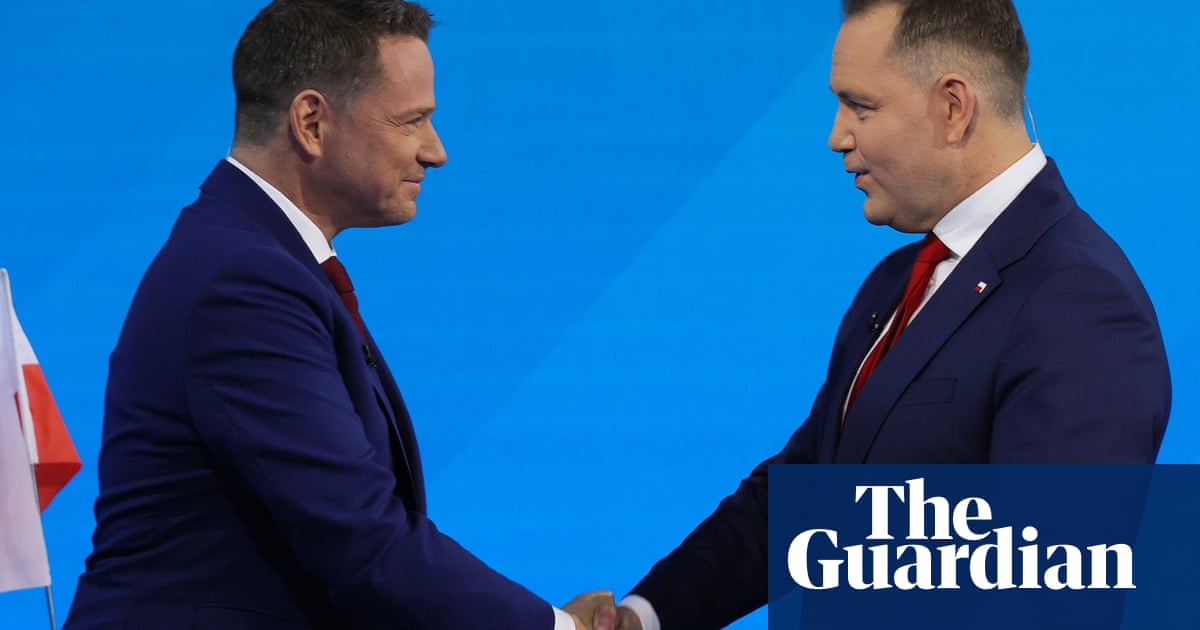Polish presidential candidates offered different visions ofPolandand its relations with Ukraine in a televised debate ahead of next week’s run-off, which remains on a knife-edge.
During a head-to-head debate lasting two hours, the centrist Warsaw mayor Rafał Trzaskowski, from prime minister Donald Tusk’s governing pro-European coalition, faced the Eurosceptic historian Karol Nawrocki, backed by the populist rightwing Law and Justice party (PiS).
The two candidates – who qualified for the second round after coming in the top two places in the first vote last Sunday – clashed over Poland’s relations with Ukraine, EU policy, and the track records of their respective parties, which have dominated Polish politics since 2005.
Nawrocki – a conservative historian who it was revealed this week had been involved in organised fights between groups of football hooligans in his youth – characterised the election as a referendum on an unpopular coalition government led by Tusk, repeatedly dismissing his rival as “Tusk’s deputy”.
The government came to power in late 2023 promising to undo illiberal reforms by rightwing predecessors and liberalise laws on abortion and LGBTQ rights, but has made little progress, fearing a veto from the outgoing conservative president, Andrzej Duda.
The issue has loomed over the presidential election, turning the ballot into a question of whether voters want to carry through with the political overhaul or prefer an opposition president to keep the government in check – even at the cost of political paralysis.
Trzaskowski challenged Nawrocki’s attempts to paint himself as an independent candidate despite being supported by PiS, which ruled Poland between 2015 and 2023.
“You say you’re not from PiS, but people from PiS pay for your campaign, organise it and lead it … There is an English saying: if it looks like a duck and quacks like a duck, it’s a duck,” he said.
During tense exchanges on Friday night, both candidates agreed on the need to support Ukraine militarily in its fight against Russia. But they clashed over other elements of the relationship, including Ukraine’s future Nato membership and the controversy over the import of cheaper agricultural goods,which has led to anti-Ukrainian protests by Polish farmers.
Courting the rightwing voters of twofar-right candidates who came thirdand fourth, Nawrocki already said this week thathe would block Ukraine’s accession to Nato.
On Friday, he repeated his criticism of the farming arrangements. “As a president, I will do everything to really support [Ukraine] militarily … but I will not let [them] make Poland an auxiliary enterprise.”
Trzaskowski, a former EU lawmaker and junior minister, attacked him for “speaking the language that favours Putin”, also citing his rival’s criticism of EU plans to boost member states’ militaries. “We need to be tough with Ukrainians, protect Polish interests … but help Ukraine, because Putin has to break all his teeth in Ukraine and not attack anyone else,” Trzaskowski said.
Just over a week before the vote, the candidates remained virtually level, with individual polls showing narrow leads both ways within the margin of error.
Experts said voter mobilisation – with turnout already at a record high in the first round – could play a decisive role in deciding the outcome.
On Sunday, both candidates will lead rival marches across Warsaw, symbolically starting simultaneously on parallel streets but going in opposite directions.
